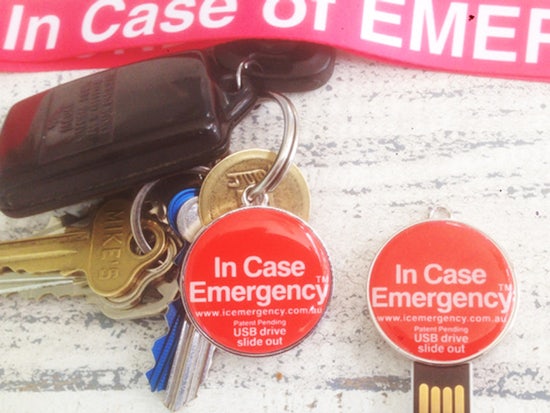In case of emergency, carry an ID USB
Older Australians are among those reaping the benefits from a new form of emergency identification that is now gaining momentum thanks to one Western Australian inventor

Carry your ‘In Case of Emergency’ USB ID with you (Source: I.C Emergency)
The In Case Emergency USB has been made available to the general public for almost a year now and aims to provide Australians with a means of identification (ID), next of kin contact information, allergy lists, medical history and even medications all in one small, versatile USB key ring.
Inventor, Tony Walton, says the inspiration for the idea which is now starting to take off came from one of his nursing friends who experiences first-hand how hard it can be to find identification, next of kin and health information for some patients.
“As an emergency department nurse, my friend at times has spent up to five hours on the phone trying to track down relatives of people who don’t have ID on them,” he says.
“In some cases patients pass away before loved ones can be found and contacted – she says it happens far too often – at least 5-6 times a week.
“Hearing this made me wonder why don’t people carry In Case of Emergency ID?”
Targeted at every one of all ages and stages of life, Mr Walton says that older people are certainly among those able to benefit significantly from the invention.
“Older Australians very rarely carry In Case of Emergency ID,” he says. “And quite simply, they do have accidents and by having one of these USB’s, information can be accessed quickly and easily.
“The USB carries basic but essential information for authorities – it’s in a format that can be read by any computer operating system and, like a Word file, you can add any information you like, including photos.
“If someone is injured in an accident, and unconscious or in shock, they can’t communicate who to notify, or their health status. The USB has emergency contact phone numbers so relatives can be notified quickly.”
Mr Walton says that hundreds of the USB’s have already been purchased for elderly family members and that he has received comments from elderly customers who have put it to use.
“There is no address, no date of birth on the files so that if the keys were lost or stolen, there is no useable information,” Mr Walton says.
“Thousands of the USB’s have already been purchased in Australia – it’s really taken off.
“The first users were mainly motorbike riders and travellers, but now a lot of customers are women who buy a medallion USB for each of their family members.
“It makes sense and at just under $20 for each USB, it is affordable.”
In Case Emergency USB’s are available for purchase online.























